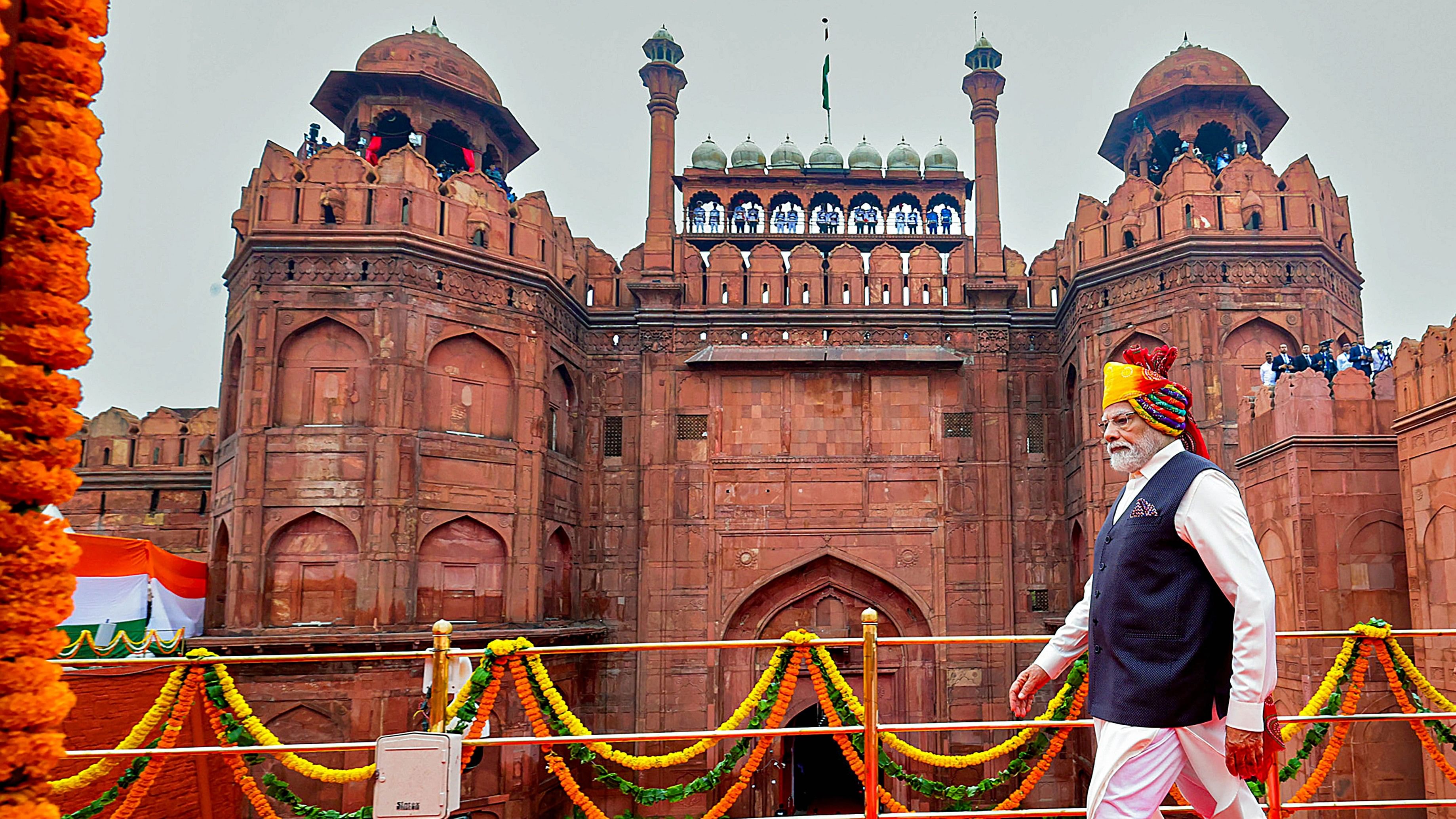
Prime Minister Narendra Modi after addressing the nation on the occasion of the 77th Independence Day from the ramparts of Red Fort, in New Delhi, Aug 15, 2023.
Credit: PTI Photo
The country’s borders are now more secure than ever, Prime Minister Narendra Modi said on Tuesday, a day after the Indian Army had another round of negotiations with the Chinese People’s Liberation Army seeking disengagement of front-line troops in Depsang and Demchok to end the three-and-a-half-year-long stand-off in eastern Ladakh.
“India has gained a new strategic strength in recent years and today our borders are more secure than ever,” the prime minister said. He was delivering his speech on the occasion of the 77th Independence Day, amid continuing tension along the India-China border in eastern Ladakh, with a large number of the Indian Army soldiers deployed to resist the aggressive moves by the Chinese PLA.
The prime minister said that the armed forces of the country should be empowered and remain youthful and prepared for war.
Modi acknowledged the presence of the chieftains of nearly 600 border villages at the Independence Day ceremony at the Red Fort in the national capital. “The border villages of our country were earlier considered as the last villages of the country. We have transformed the entire thought process. They are not the last villages of the country. They are the first villages of our country,” said the prime minister.
New Delhi has adopted a programme to develop sparsely populated villages along the country’s borders.
The move is apparently aimed at making it easier for people to live in the villages along the India-China Line of Actual Control (LAC) and dissuading them from migrating to other places. New Delhi has been worried as the thinning population on its side of the LAC could prove to be a disadvantage for it in its boundary negotiation with Beijing.
The prime minister said that the nation was experiencing a sense of security. “When the nation is secured and peace is established, it helps us realize new dreams of progress,” he said, adding, “The era of serial bomb blasts is now in the past and the death of innocents is now part of history. The country has witnessed a significant drop in terrorist attacks.”
He also said that the areas affected by ultra-left insurgency had also seen a major transformation, creating a conducive environment for change.
Unlike his Independence Day speeches in 2020 and 2021, the prime minister, however, this year avoided any tacit reference to the threat faced by India due to China's expansionist moves.
New Delhi and Beijing are now discussing the possibility of Prime Minister Narendra Modi and Chinese President Xi Jinping having a bilateral meeting on the sidelines of the BRICS summit, scheduled to be hosted by South African President Cyril Ramaphosa in Johannesburg from August 22 to 24. Modi is also expecting to host Xi in New Delhi on September 9 and 10 – for the G20 summit that he will chair.
The relations between New Delhi and Beijing further nosedived ever since the stand-off between the Indian Army and the Chinese PLA along the LAC in eastern Ladakh started in April-May of 2020.
To avert the awkward spectacle of the Prime Minister hosting the Chinese President amid the continuing stand-off, New Delhi is keen on a meeting between the two leaders in Johannesburg, hoping that it could lead to a thaw in ties.
A few weeks after the India-China military stand-off had reached a flashpoint with the June 15, 2020, violent clash between the soldiers of the two nations in Galwan Valley, the prime minister, delivering his speech on the occasion of the country’s 74th Independence Day, had subtly referred to the nation’s twin challenges – the communist neighbour’s bid for territorial aggression and the menace of extremism exported by Pakistan.
He had said that India had been fighting against both expansionism and terrorism. He had referred to the twin challenges in his Independence Day speech in 2021 too, again without directly referring to either Pakistan and China.
However, while addressing the nation from the rampart of the Red Fort on August 15, 2022, Modi had tacitly referred to the threat posed to India by terrorism and proxy war exported and waged by Pakistan - but had avoided mentioning the security challenges presented by China.
